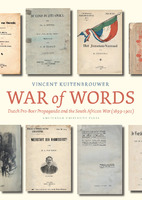War of Words
Dutch Pro-Boer Propaganda and the South African War (1899-1902)
Abstract
Between 1899 and 1902 the Dutch public was captivated by the war raging in South Africa between the Boer republics and the British Empire. Dutch popular opinion was on the side of the Boers: these descendants of the seventeenth-century Dutch settlers were perceived as kinsmen, the most tangible result of which was a flood of propaganda material intended as a counterweight to the British coverage of the war. The author creates a fascinating account of the Dutch pro-Boer movement from its origins in the 1880s to its persistent continuation well into the twentieth century. Kuitenbrouwer offers fascinating insights into the rise of organisations that tried to improve the ties between the Netherlands and South Africa and in that capacity became important links in the international network that distributed propaganda for the Boers. He also demonstrates the persistence of that stereotypes of the Boers and the British in Dutch propaganda materials had lasting effects on nation building both in the Netherlands and South Africa of the period. Tussen 1899 en 1902 was Nederland in de ban van de oorlog die woedde in Zuid-Afrika tussen de Boerenrepublieken en het Britse Rijk. Veel Nederlanders steunden in die tijd de Boeren, die werden beschouwd als 'stamverwanten', en dat uitte zich onder andere in een vloedgolf van propagandistisch materiaal om een tegenwicht te bieden tegen de Britse berichtgeving over de oorlog. Dit boek bevat een grondige analyse van de Nederlandse pro-Boeren beweging vanaf haar begin in de jaren 1880. Ten eerste is er aandacht voor de organisaties die de banden tussen Nederland en Zuid-Afrika trachtten aan te halen en zo belangrijke schakels werden in een internationaal netwerk waarlangs de propaganda voor de Boeren werd verspreid. Ten tweede wordt de inhoud van de bronnen behandeld waarbij naar voren komt dat de beeldvorming over Zuid-Afrika in Nederlandstalige publicaties sterk gekleurd was door enkele hardnekkige stereotypen. Ten slotte komen de langetermijngevolgen van de Nederlandse pro-Boeren beweging aan bod, een onderwerp waar in de literatuur tot nu toe nauwelijks aandacht voor is geweest. Aan de hand van bronnenmateriaal wordt aangetoond dat de propagandacampagne voor de Boeren nog lang nagalmde in de twintigste eeuw, zowel in Nederland als Zuid-Afrika.
Keywords
geschiedenis; history; geography; and auxiliary disciplines; Afrikaners; Boer; Dutch language; Netherlands; Opposition to the Second Boer War; Second Boer War; South Africa; South African Republic; Willem Johannes LeydsDOI
10.5117/9789089644121ISBN
9789089644121OCN
804824339Publisher
Amsterdam University PressPublisher website
https://www.aup.nl/Publication date and place
2012Classification
History
General and world history


 Download
Download